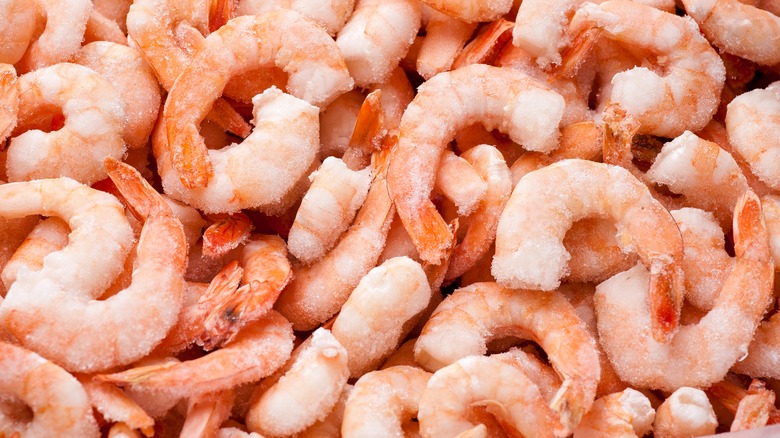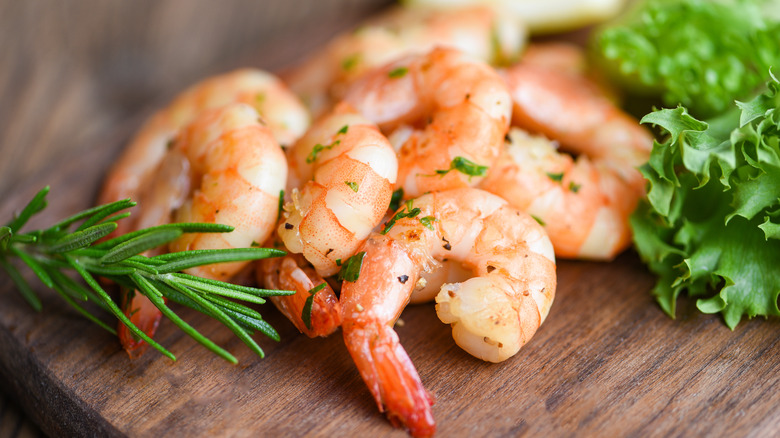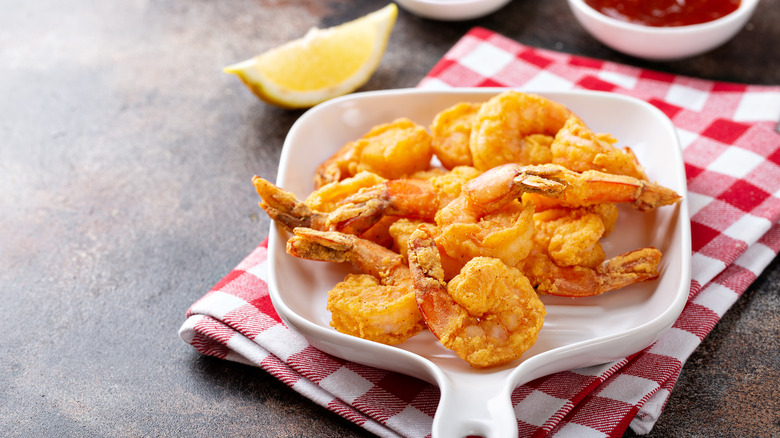Do You Have To Devein Every Type Of Shrimp?
Do you like popcorn shrimp, those little bite-sized shrimp balls that are deep-fried in a crispy coating? Maybe you're a fan of shrimp cocktails, and you think nothing compliments the taste of shrimp more than that tangy red sauce. Or maybe you like shrimp in your pasta, served in a rich white wine sauce. Whichever way you enjoy your shrimp, be it fried, grilled, or soaked in butter, there's no denying that they're a very popular and accessible seafood. The South Florida Reporter tells us that an astounding 1 billion pounds of the crustaceans are eaten each year by Americans — a pretty high estimate that's far from shrimpy.
Outside of the usual shrimp offerings you may find at your local grocery store or Red Lobster, there's actually an impressive variety of the seafood out there. The American Shrimp Processors Association reports that there are over 2,000 species of shrimp in the world, ranging from the common aquarium shrimp to the colorful but powerful mantis shrimp. Unless you have a lot of butter and a big enough net, you may not be able to see a large majority of these little fellows on your plate at your next seafood dinner.
Fortunately, there is still a good amount of shrimp that you can sample for yourself. But, even if you were to get your hands on some pretty wild variety of shrimp, do you have to go through the tedious process of deveining them, or are the shrimp that are "vein-free?"
You don't have to devein smaller shrimp
While deveining shrimp isn't too hard of a process, it can get pretty tedious after a little bit. What sort of shrimp can you buy so that you don't need to worry about going through the deveining process before you cook it?
According to Bon Appetit's test kitchen, not every single type of shrimp needs to be deveined. If you have some particularly small types of shrimp, deveining them is completely optional, and you'll most likely be fine if you were to skip the process entirely. For larger shrimp, however, you may notice a thick black line running along the flesh. This, Lifehacker tells us, is not really a "vein" at all, but the shrimp's digestive tract. Inside this digestive tract is the shrimp's digested "waste" products.
Lifehacker tells us that if this digestive tract is not removed, the "waste" within the shrimp will have a gritty, rough texture compared to the tender and sweet shrimp meat. Fortunately, depending on how large your shrimp is, you should have no trouble deveining (or in this case, "de-digesting?") the shrimp.
But what would happen if, by accident, you ate a shrimp with its veins intact? Would its digestive tract get you sick, or would it leave a bad taste in your shrimp dish?
You'll be fine if you don't devein your shrimp
Okay, so you forgot to devein some shrimp, and you just found that out when you tried some of your shrimp cocktail. What happens now? Are you going to get sick? Is your shrimp cocktail contaminated?
According to a 1987 question-and-answer section from the South Florida Sun-Sentinel, some view the practice of deveining shrimp as "as unnecessarily fastidious and a lot of trouble." If you were to eat a veined shrimp, chances are that you would most likely be none the worse for wear. The "material" inside the shrimp's digestive tract is nothing more than plankton and is safe to consume. Of course, the shrimp must be fully cooked or else you'll risk eating raw seafood.
Some, however, do recommend that you take the time to devein your shrimp. TJ Delle Donne of Johnson & Wales University tells Consumer Reports that it's "highly recommended" to devein your shrimp before cooking — although Donne does note that smaller shrimp, like rock shrimp, won't require any deveining. Prepared Cooks explains that while consuming a veined shrimp isn't toxic or dangerous to your health, not doing so may give the shrimp a bad taste.
In the end, deveining your shrimp is generally an optional part of the process. If you have no time for it, you can skip it, and it won't cause any harm to you. But doing so will help your shrimp dish taste better.


